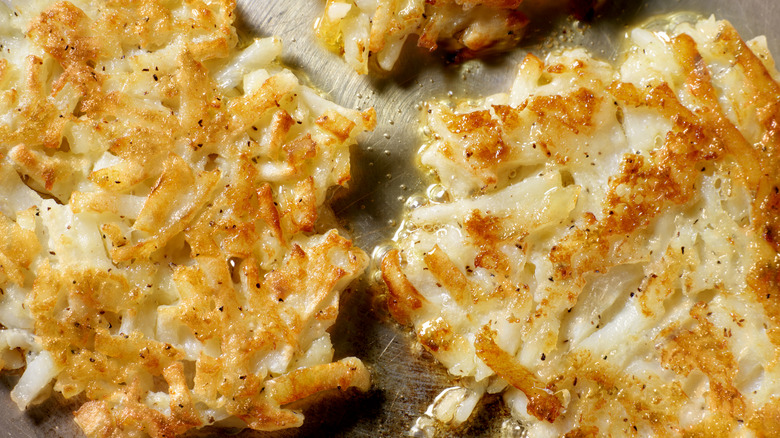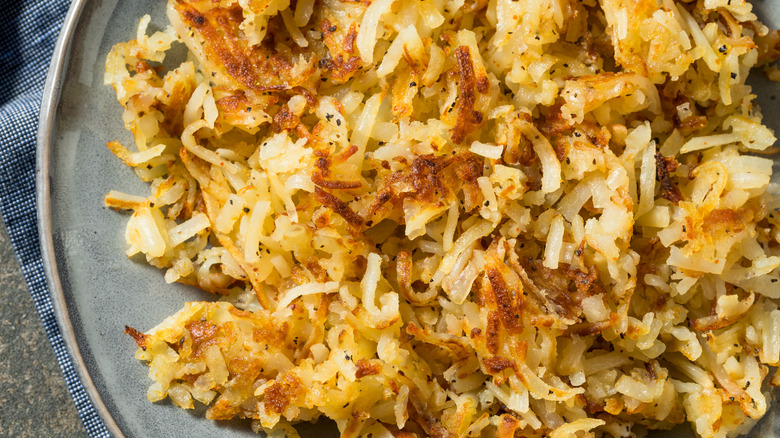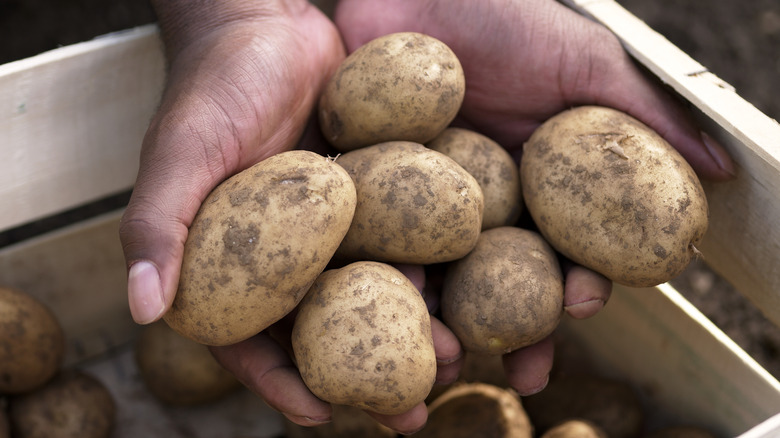Why You Shouldn't Soak Grated Potatoes When Making Hash Browns
While the eggs might be the protein on the breakfast plate, the crispy, golden hash browns can steal the show. Putting aside the fast food variety served in a sleeve, the homemade version is even tastier when the cook remembers to avoid soaking grated potatoes.
In a MarthaStewart.com article, Ronna Welsh, the author of The Nimble Cook and the owner and chef instructor at Purple Kale Kitchenworks in Brooklyn, N.Y., called attention to starch's importance in creating crispy, well-formed hashbrowns. Peeling and grating potatoes in advance can be detrimental to this final product. Specifically, Walsh believes that rinsing or soaking grated potatoes in water removes too much starch and stated, "Starch is key to holding the potato pieces together for things like hash browns or potato pancakes." If that key component is rinsed away, the possibility of getting a crunchy fry on those potatoes lessens.
While some cooks might think that they are being thoughtful by washing those spuds and dumping the water down the drain, the reality is that the cloudy liquid they see while rinsing could be a culinary pot of gold going down the drain. Potato starch is so effective that it has been a cooking hack for making fried food crispier. The white, slurry substance can be used in fried chicken or even in a tempura batter. With hash browns, it's better to keep the starch in the potatoes than to let it go to waste.
Crispy hashbrowns are more attainable when you reduce moisture
From the perfectly fried edges to the contrast in textures, crispy hash browns are far more appealing than soggy potatoes. While the potato starch can help create the crunch, removing excess water is another key to better cooking execution.
The old saying about water and oil not mixing can be applied in the cooking world. In order for food to brown or get crispy, there cannot be excess water when cooking. Since potatoes tend to hold water, all the water inside the potatoes needs to be removed. It is more than just patting the potatoes dry. Squeezing, ringing, and doing the process repeatedly is vital to creating a better result.
Also, any excess water can cause food to splatter when frying. No one wants to be dodging oil bubbles in front of the stove. Those pops are from the oil and water coming in contact with one another. Soaking or rinsing grated hash browns before cooking can increase the potential for excess water to wind up in the pan.
Once those dry, grated potatoes hit the skillet or cast iron pan, they can work with the fat to become golden brown. As the surface becomes crunchy, the inside softens. With the addition of salt or other seasonings for taste, the first bite will satisfy with its contrast of textures.
Which potatoes are best to use for hashbrowns?
While keeping the starch and eliminating the excess water can lead to crispier hashbrowns, those techniques are just as important as choosing the better potato. Similar to making French fries, some potatoes are better suited for that plunge in the heated oil based on their starch and moisture content. For example, Russet potatoes can produce crispier results than waxy potatoes like Yukon gold or red varieties. Even though Russets need to be well drained of water, the high starch content makes for a better choice when frying. After all, no one wants to eat a plate of greasy, soggy spuds.
In addition, well-seasoned potatoes can help to increase the crispiness of the hash browns. A generous seasoning of salt can help add flavor as well as draw out additional moisture. Salt tends to pull out liquid in food. Since excess water can impede a crispy, crunchy hashbrown, it is best to use every cooking technique, including avoidance of rinsing and soaking, to ensure a flavorful bite.


